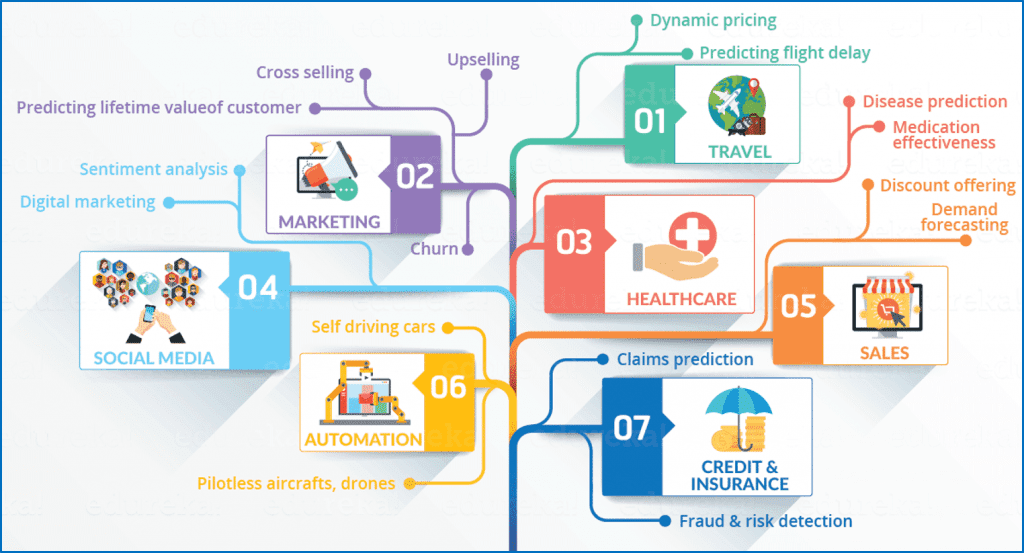Machine learning and AI can together take your enterprise to better productivity and efficiency which translates to better profitability.ML is used to make the algorithmic programs executable and uses many ML tools. The oldest tool for ML is Shogun. Without ML none of the tasks in an AI device can run.
ML’s iterative capacity is crucial as the ML trained models independently adapt to new data. Their self-learning ability akin to the human brain learns from previous experiences and computations to give repeatable, accurate and reliable decisions and results. With the advent of data analytics, the increased dependence on AI devices and data being generated by the nanosecond Machine Learning Training has gained popularity and impetus in the last decade.
Why training is crucial:
Nearly all employees are short on workplace skills and need training in these weak areas whether it be learning a new language, an advanced technique in your expertise area, or plain communication and change management. A Machine Learning Course program helps assimilate best practices in the skills required at your job. It also progresses your career to the next level with certification. Departmental training programs improve your morale and bring all employees with similar knowledge and skills on a single platform.
ML use cases for IT operations:
For sheer want of space and time, we shall discuss such cases superficially with the intent of defining the areas where ML is beneficial for the IT operations. Some of the complex areas where ML is used are:
RPA-Robotic Process Automation:
One can undertake digitization of processes in a few months instead of many years with legacy systems. The legacy system need not be replaced since ML ensures the bots can operate on such a system based on your ML algorithm. This includes all processes from existing process analysis, RPA bots programming, and humans using the bots. The implementation time is greatly cut down and the cost of replacing legacy systems avoided. Take a look at such times in the below chart.
That having been said, it is also necessary to be aware that process complexity determines analysis and programming times, and the automation levels and time-taken for human interaction with the bots can vary. Other factors that affect the time are the training through a Machine Learning Course for the bot-interacting employee and error testing.
Predictive maintenance:
Predictive maintenance to minimize operational disruptions is another crucial area where ML helps. The uptime and maintenance costs are the factors directly impacted by the regular maintenance of robots, bots, and connected machinery. In business parlance, this translates into cost savings of millions of dollars. A Nielsen study shows that some industries suffer downtime costs of 22,000 USD per minute.
Manufacturing/Industrial analytics:
Many industrial assets like Chillers, Boilers, Batteries, Turbines, Transformers, Valves, Circuit Breakers, Generators, Meters, and Sensors are all connected to the ML through IoT platforms. Popularly referred to as industrial-analytics ML helps reduce maintenance costs, manufacturing effectiveness and reduces downtime throughout the system from production to logistics.
Supply chain and inventory optimization:
ML leverages the optimization of such processes to the next level greatly reducing supply chain costs while increasing the organization’s efficiency and productivity.
Robotics:
ML helps automate physical logistics and manufacturing process by introducing automated advanced robotics. The resultant effects are improved effectiveness and time-saving.
Collaborative Robot:
Cobots use ML to achieve automation with a flexible process. The Cobot’s ML process, engineers the automated response of flexible robots to learn from past experience and mimicking.
Qualitative benefits:
Some of the benefits of using ML-enabled use cases are:
- Better performance.
- Improved production continuity and rhythm.
- Increased worker productivity.
- Increased availability of time for repair and maintenance work.
- Better team preparation and interventions.
- Effective management of inventories and spare parts.
- Reduced costs on energy.
A study conducted by McKinsey reports that ML has the potential to use cases and provide the following benefits.
- Downtimes reduced by 50 percent.
- MTBF increased by 30 percent.
- The useful life of machines upped to 3-5 percent.
- Inventories in spares cut to 30 per cent.
- Maintenance costs declined by 10-40 percent.
- Injuries to the workforce declined by 10-25per cent.
- Waste reduces by 10-20 percent.
- Advanced analytics reduces environmental impact, improves employee morale and customer satisfaction.
- Betters product quality and improves performance.
In parting, if you want to do a Machine Learning Course to effectively learn ML applications try Imarticus Learning. Their machine learning training fast-tracks your career with widely-accepted ML certification. For more details in brief and further career counseling, you can also contact us through the Live Chat Support system or can even visit one of our training centers based in - Mumbai, Thane, Pune, Chennai, Hyderabad, Delhi, Gurgaon, and Ahmedabad.








